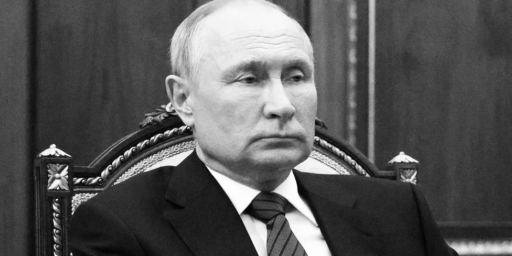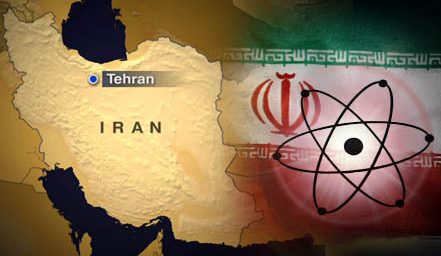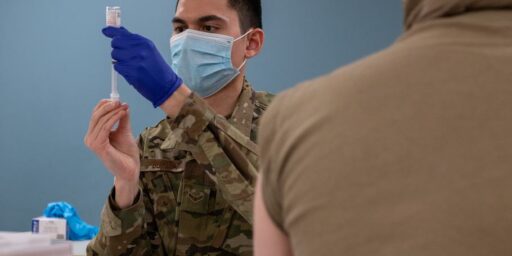Tony Blankley: Bring Back the Draft
 Tony Blankley, former press secretary to Newt Gingrich and editorial page editor of the Washington Times, has a new book out that, among other things, argues for reinstatement of the military draft. Unlike liberals like Charlie Rangel or even centrist Phil Carter, he doesn’t do so on the basis of “fairness” or spreading the burden but rather on the sheer need for manpower.
Tony Blankley, former press secretary to Newt Gingrich and editorial page editor of the Washington Times, has a new book out that, among other things, argues for reinstatement of the military draft. Unlike liberals like Charlie Rangel or even centrist Phil Carter, he doesn’t do so on the basis of “fairness” or spreading the burden but rather on the sheer need for manpower.
John Hawkins interviews him. Here’s an excerpt:
Let me give you, to me, the biggest argument and that is the almost 4500 troops that have been killed in Iraq and more thousands than that that have been seriously injured. All of that came after we defeated the Republican Guard. Rumsfeld was correct that we only needed about 80,000 troops to knock off the Republican Guard. They were wrong to think that we could occupy that country with only those 80,000 or 100,000 troops. In Germany, after WW2, we flooded the zone. When the 80,000 elite forces finished their fighting, we needed to flood the zone with 300,000 or 400,000 ground occupying troops. Every village, every main intersection, every building guarded — the resistance would never have arisen. We would have saved 4000 lives if we’d had enough troops. We sacrificed lives.
[…]
This was a relatively small war. Now, what happens if the Jihadis overthrow the Pakistani government — a very unstable government. …They have nuclear weapons. If we want to stop the Jihadis from getting nuclear weapons, we’d have to go into Pakistan and try to stop that. We don’t have remotely the number of troops to do that.
Moreover, as the years unfold, according to the intelligence community — the day before I sent my manuscript to the printer — we’re likely to have resource wars over water and oil in the coming decades. China already has a lot of troops in Sudan guarding their oil fields right now.
So, I think it’s obvious that we can’t raise enough troops by the voluntary method. I’ve got a young son, a new 2nd Lieutenant in the Army — I’ve met his friends, …I’ve talked with the generals, and I know how wonderful the volunteer service is, but there just aren’t enough of them.
Blankley, with whom I’ve had conversations and genuinely like and respect, is almost certainly right that, if we need a radically larger force than we now have for some future contingency, we’re not going to be able to achieve it through the current system. But a slightly plausible future emergency strikes me as a weak rationale for a definite present infringement on personal liberty and weakening of the morale of a military that he admits is superb.
Beyond that, the most manpower intensive missions are those like we’re fighting in Iraq and Afghanistan: post-combat or combat-plus operations like COIN and SASO that require a large, continuing presence. The scenarios he envisions would likely be met with massive aerial strikes, not infantrymen fighting door-to-door.
Photo: Sharing Miracles.






I think the converse is the better solution: reduce the commitment of troops to what we can actually sustain. IMO there’s only one reason to have a large standing infantry and that’s to occupy territory. I don’t believe that’s something most Americans are interested in.
While I understand Mr. SChuler’s point above, troops needed to occupy territory, I wonder how he thinks the territory is gained in the first place?
OK, I actually came to make an admittedly small point about a draft. In 1964, upon leaving school, I tried three times to join our armed forces (twice Army, once Air Force) – and was turned down. So I figured I was “safe” and got a job. Then was promptly drafted. Then discharged, after several months, as “medically unfit for induction.”
Point being, the draft board set its standards to get a certain number of bodies regardless of the condition of those bodies, while the reality of requirements was ignored.
I observed years ago (perhaps even at OTB) that Bush faced a catch-22. He needed a draft to win his war, but ask for a draft, he could never have his war. I was answered (then) by the conventional Right who said that troops weren’t needed. I said then that a million men, a troop on every corner, was needed to make the peace. So sure. A draft.
FWIW, I think the best argument for a draft/national-service arrangement is that we all live so darn long now. We are approaching the day when a 2-year commitment is a 2% commitment.
I’m all for the draft – I’m 74 yrs old…..
Well its the same argumant being made for taking someone else’s hard earned wealth because it’s a free lunch.
Is this even really that big an issue? After all, the biggest manpower tie-down is the Iraq occupation, and that is at least supposedly winding down into its final phase (with all US troops out by 2011).
As long as you don’t launch yourself into another Iraq-style war, what pressing manpower requirements are there that would require conscription to meet them? You could say “Afghanistan”, I suppose, but that’s only if we try to go full “protect the population” counter-insurgency there, and try to do it alone.
“When the 80,000 elite forces finished their fighting, we needed to flood the zone with 300,000 or 400,000 ground occupying troops. Every village, every main intersection, every building guarded — the resistance would never have arisen. We would have saved 4000 lives if we’d had enough troops. We sacrificed lives.”
I challenge that assumption. Aside from the logistics/medical footprint required to support that many troops, it fails to acknowledge that it increases the number of targets as well. How many more soldiers and marines would have died before the body and vehicle armor to support those numbers was able to be produced? It took long enough for the ones who were there. This in a nation the size of California, loaded with weapons caches, and before the UAV capabilities we have now. I think a case can be made that flooding the zone might have been a disaster with even thousands more casualties.
Though maybe not if we had fought our way through Syria first with the Soviets taking out Iran from the East. But that was hardly an option, Tony, was it?
Yeah, a draft would be one way to increase the size of the military. Repealing the 13th amendment should bring down the cost of food and cotton, too.
I’m glad to see Blankley proposing this. The logical extension of Gingrich and other conservatives’ claims that we are in WWIII and require perpetual invasions of various Islamic satrapies is that we need alot more bodies to fight those wars. The only way to do this is through a draft. At least it is out in the open and the cost of following their advice is available for all to see.
Just because Tony Blankley makes a daft proposal about the draft doesn’t condemn conservative proposals and principles. To claim such is equally daft.
Fighting that kind of war is exactly what loses us any kind of moral standing in the world. “Collateral damage” is always enormous, and makes it impossible to govern afterward. Witness the growing condemnation of Israel today for its actions in Gaza. Condemnation, that is, from everywhere except this in nation, which cheers them on and makes comments like that quoted above.
Dave Schuler, can I apocryphally quote Lev Bronstein?
“You may not be interested in war, but war is interested in you.”
BTW, I am an Infantry officer, heading back to Iraq for my second tour in three years.
Invading Iraq hasn’t made us safer. Invading Afghanistan hasn’t made us safer. In fact, if pushing the Taliban into Pakistan destabilizes nuclear Pakistan, it’s made us much less secure overall.
The draft is going in the exact wrong direction. We need to return to a military just big enough to defend America (say, 100,000 members, $100 billion) and not big enough that we can easily run around kicking over beehives. Considering that we face no plausible existential threats, spending $800 billion a year is not just stupid but absurd.